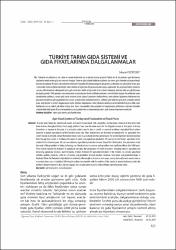TÜRKİYE TARIM GIDA SİSTEMİ VE GIDA FİYATLARINDA DALGALANMALAR
Abstract
Türkiye’de son yıllarda et, süt, sebze ve saman fiyatlarında ani ve şiddetli artışlar gözlendi. Tarihte de sık sık gözlenen gıda fiyatlarının artışlarının temel nedeni gıda arzı sorunları olmuştur.Tarım ve gıda ürünleri fiyatlarını açıklamak için tarım-gıda sistemleri yaklaşımı elverişli kavramsal araçlardır.Bir tarım gıda sistemitemelde tarım faaliyetinde kullanılan doğanın dengesinin sürdürülmesini sağlamalıdır.Tarım-gıda sisteminden beklenen ikinci önemli işlev tarım üretimi ile toplumun ihtiyaçları arasında denge sağlamaktır. Bu çerçevede Türkiye tarımının son yüz yıllık dönemine bakıldığında tarım-gıda üretiminin sürekli arttığı ve bir iki kısa dönem haricinde üretimin nüfusun gıda ihtiyacını karşıladığı görülür. 1980 yılından sonra ekonomide ve tarımda neo-liberal politikalar izlenmesi önemli etkiler doğurur. Bu politikalar tarım desteklerinin azaltılması, tarıma girdi sunan ve tarım ürünü işleyen kurumların özelleştirilmesi, tarım ürünleri fiyatlarının belirlenmesinin piyasalara bırakılması gibi uygulamalardan oluşur. Sonuçta tarım faaliyetleri zayıflar, üreticiler gelir kaybına uğrar, kimi ürünlerin üretimi azalır. Gıda fiyatları ve üretim dalgalanmaya başlar. Üretimin dalgalanması kimi yıllarda kuraklıkla ya da hastalıklarla birleşince kıtlık, ürün fiyatlarında ani ve şiddetli yükselişler ortaya çıkar. Ayrıca hayvancılıkta ülke gerçekleri ile bağdaşmayan politikaların izlenmesi buradaki sorunları kalıcı hâle getirir. Kısaca deneyimlenmiş ve çözümleri olan sorunlara mevcut tarım-gıda sistemi cevap verememektedir. In recent years Turkey has experienced sudden and severe increase meat, milk, vegetables, and hay prices. Increases in food prices have been observed throughout history Food supply problems have been the main reason for the frequent increase in food prices in history. Sometimes an increase in the price of a particular product may be due to specific or seasonal conditions. Agricultural-food systems approach to explain agricultural and food products prices and other developments are favorable conceptual tools. An agriculture-food system should, in principle, ensure that natural means used in agricultural activities are replaced. The second important function expected from the agri-food system is to balance the needs of society and agricultural production. We can look to the Turkey’s agriculture in this context for last hundred years. We can see continuous agricultural production increase. Except for a brief period, food productions meet the needs of the population in Turkey. Following, neo-liberal policies in economy and agriculture have significant effects after 1980 years. These policies include the reduction of agricultural subsidies, the privatization of which institutions providing input to agriculture and processing agricultural products, and the leaving of prices formation for agricultural products to the markets. As a result, agricultural activities weaken, producers suffer loss of income, and production of some products decreases. Food prices and production begin to fluctuate. When the fluctuation of production is combined with drought or disease in some years, scarcity and sudden and severe increases in product prices occur. In addition, following the policies incompatible with the realities of the country in animal husbandry makes the problems here permanent. In short, the existing agri-food system cannot respond to the problems experienced and solved.
Source
Toplum ve HekimVolume
34Issue
5Collections
- Makale Koleksiyonu [443]
- TR-Dizin İndeksli Yayınlar Koleksiyonu [1037]



















